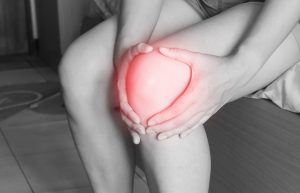 If you carried an extra 50 to 100 pounds strapped onto your waist, by the end of the day, your entire lower body would hurt. The muscles would be painful, but so would the joints. That’s because excess weight can trigger hip and knee pain. The American Association of Orthopedic Surgeons says the hip and knee joints are affected by weight. They experience a force that’s greater than seven times that person’s weight. If you weigh 250 pounds, that force is 1750 pounds. If you lose 100 pounds, the force reduces to 1050 pounds of pressure, a huge difference. Weight loss is one controllable factor to reduce pain in the lower joints.
If you carried an extra 50 to 100 pounds strapped onto your waist, by the end of the day, your entire lower body would hurt. The muscles would be painful, but so would the joints. That’s because excess weight can trigger hip and knee pain. The American Association of Orthopedic Surgeons says the hip and knee joints are affected by weight. They experience a force that’s greater than seven times that person’s weight. If you weigh 250 pounds, that force is 1750 pounds. If you lose 100 pounds, the force reduces to 1050 pounds of pressure, a huge difference. Weight loss is one controllable factor to reduce pain in the lower joints.
Obesity and inflammation go hand in hand.
When you accumulate an excessive amount of fat, it can interfere with body processes. The excess of macronutrients causes fatty tissues to release inflammatory mediators, which are small molecules the cells release when there’s an infection or injury. They cause the immune response to begin. That inflammation can cause problems like heart disease, diabetes, and joint issues. Obesity is the leading risk factor for knee osteoarthritis. It’s the reason knee and hip joint replacements are more common in people with a higher BMI.
Weight loss addresses several factors.
First and foremost, weight loss reduces the pressure on the knee joint. It also reduces inflammation. Doing the first two things reduces arthritis severity and allows for more movement. It can cause a remission in osteoarthritis or other causes of knee pain. It also causes the degeneration of the cartilage to slow. Eating healthy and losing weight lowers the risk of gout and reduces uric acid levels.
It’s all about eating healthier and moving more.
You can lose weight in many ways. The best way is to change to a healthy whole food diet. Eliminating processed food and sugar from the diet can help you lose weight and reduce inflammation since sugar causes inflammation. Many whole foods are anti-inflammatory. Berries, fatty fish, broccoli, avocados, green tea, and peppers are a few anti-inflammatory foods you should include in your diet.
- If you have chronic, severe knee pain, always see a healthcare professional first to ensure starting an exercise program won’t exacerbate it. Once given the okay, proceed slowly and avoid high-impact exercises.
- Work with a personal trainer to adapt exercises to your condition and reduce joint stress. Pay close attention to how your body feels and what it’s telling you. If an exercise hurts, don’t do it.
- Focus on low-impact exercises like swimming, walking, or riding a bicycle. If you use a stationary bike, ease up on the tension until you find one that doesn’t hurt your knees. As your muscles get stronger and you lose weight, you can increase the tension on the bike.
- One study found that losing as little as 10% of your body weight reduced pain and improved joints. Losing 20% increased the benefits, improved life quality, and made knee function better.
For more information, contact us today at LIV Fitness
